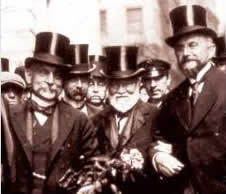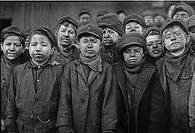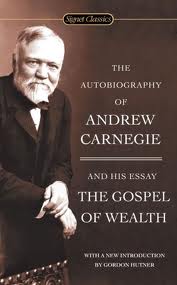 The idea of social position depending on hard work and initiative helped perpetuate the myth that America did not have a class system. It was claimed that no matter what the social position of their parents, a person’s own social position would be determined by the effort they put into their occupation. This was in contrast to the class structure of Britain and Europe, which limited the social mobility of those born to the working classes. In Britain, for example, the class a person was born into would influence the type of education their children would get, the neighbourhood they lived in, the types of services they had access to, the way other people treated them, and their opportunities and expectations for social advancement. It was this hereditary limiting of opportunities for social advancement of working class children that was supposed not to exist in America.
The idea of social position depending on hard work and initiative helped perpetuate the myth that America did not have a class system. It was claimed that no matter what the social position of their parents, a person’s own social position would be determined by the effort they put into their occupation. This was in contrast to the class structure of Britain and Europe, which limited the social mobility of those born to the working classes. In Britain, for example, the class a person was born into would influence the type of education their children would get, the neighbourhood they lived in, the types of services they had access to, the way other people treated them, and their opportunities and expectations for social advancement. It was this hereditary limiting of opportunities for social advancement of working class children that was supposed not to exist in America.
During the nineteenth century people came to worship economic success and to “enshrine wealth as the essence of value”. Hard work was the promoted as the route to this success and “received the endorsement of a continuing stream of writers, workers, businessmen, and politicians.” Books and stories illustrating the work ethic flourished. They emphasised “hard work, punctuality, and reliability”.
A key part of the propaganda was the iidea of the ‘self-made’ man which claimed that any man could make a fortune, no matter what his origins, provided he worked hard and was reasonably intelligent. Through example and reiteration, the myth that anyone could become rich in America if they try hard enough became firmly established.
The myth of the self-made man was based more on folklore than fact and few poor boys ever became  wealthy. By exaggerating the opportunities available to ordinary working people, business people and their supporters reinforced materialistic values and material success as the goal to aspire to and promoted business enterprise as the pinnacle of human achievement. Those who prospered deserved to, those who suffered also deserved their fate, and the social hierarchy was therefore just.
wealthy. By exaggerating the opportunities available to ordinary working people, business people and their supporters reinforced materialistic values and material success as the goal to aspire to and promoted business enterprise as the pinnacle of human achievement. Those who prospered deserved to, those who suffered also deserved their fate, and the social hierarchy was therefore just.
In the US “newspapers, books, interviews, speeches, and literature abounded with praise of the successful who had made it on their own.” Success was defined in terms of doing well in business and making lots of money. “[E]ntrepreneurship was idolized in every precinct from the pulpit to the political podium.” Owning one’s own business was supposed to be a route to success that was open to all, as Abraham Lincoln explained in an 1861 speech to Congress:
....there is not of necessity any such thing as the free hired laborer being fixed to that condition for life... The prudent, penniless beginner in the world, labors for wages awhile, saves a surplus with which to buy tools or land for himself, then labors on his own account for awhile, and at length hires another new beginner to help him. This is a just, and generous, and prosperous system; which opens the way to all—gives hope to all, and consequent energy and progress, and improvement of conditions to all.
 Self-help books supplemented fiction in showing the way to success. Andrew Carnegie, himself a self-made man who started out as a poor immigrant and became one of the wealthiest men in America, published essays advising young men how to succeed in business. At the turn of the century he wrote that success was a “simple matter of honest work, ability, and concentration” and so was available to “the sober, frugal, energetic and able mechanic” as well as to the office boy and clerk of similar character.
Self-help books supplemented fiction in showing the way to success. Andrew Carnegie, himself a self-made man who started out as a poor immigrant and became one of the wealthiest men in America, published essays advising young men how to succeed in business. At the turn of the century he wrote that success was a “simple matter of honest work, ability, and concentration” and so was available to “the sober, frugal, energetic and able mechanic” as well as to the office boy and clerk of similar character.
However Carnegie’s own career was the exception rather than the rule. The wealthy and the top industry people, even in the nineteenth century, were not men who had worked their way up from poor beginnings but mainly those who came from privileged backgrounds.
Nonetheless the myth was perpetuated in an effort to promote hard work and industry amongst workers and the occasional story of the boy who did make it, like Carnegie, was told over and over to give veracity to the myth. Such stories were popular in the community because they offered hope. A favourite of the early twentieth century was that of Henry Ford who became one of the most famous and wealthiest businessmen of his time, after starting life as a farm boy and a mechanic.
 Self improvement books at the turn of the 20th century with names such as The Conquest of Poverty, Pushing to the Front, Success under Difficulty, all preached the message of how any motivated, hard-working individual could overcome life’s obstacles and reach the pinnacle of success: wealth and power.
Self improvement books at the turn of the 20th century with names such as The Conquest of Poverty, Pushing to the Front, Success under Difficulty, all preached the message of how any motivated, hard-working individual could overcome life’s obstacles and reach the pinnacle of success: wealth and power.
The myth of the self-made man is still promoted by businessmen despite decreasing social mobility and growing inequity. James Bell of Texas State University Business School told an audience in 1997 the story of a visit by the president of the Railroad to one of the railway yard’s where he chatted with a worker driving spikes into railroad ties. When asked how he knew the president of the Railroad the worker told his workmate how they had both started work together “twenty five years ago out here in the yard.”
“You mean the president of the railroad started out here swinging a sledge hammer?” “Yes,” was the reply. “Then how come he’s the president , and you’re still out here in the yard?” The reply: “Twenty-five years ago, I came to work for $1.25 an hour. BUT he came to work for the railroad!”
Such stories keep the myth of the self-made man alive. David Griffiths in his book Whither Work noted:
There are real opportunities for some to succeed from poverty to wealth and from obscurity to prominence, but for the majority these opportunities are illusionary, peripheral and seductive. That these real opportunities are for the few is irrelevant to the fact that they are nonetheless real.
In the 2012 election campaign President Barack Obama tweeted "You can make it here in America if you try. That's who we are. That's who we're fighting for." #AmericaForward